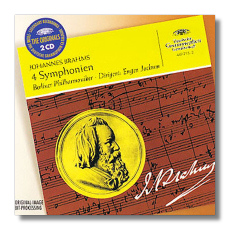
The Internet's Premier Classical Music Source
Related Links
- Brahms Reviews
- Latest Reviews
- More Reviews
-
By Composer
-
Collections
DVD & Blu-ray
Books
Concert Reviews
Articles/Interviews
Software
Audio
Search Amazon
Recommended Links
Site News
 CD Review
CD Review
Johannes Brahms

- Symphony #1 in C minor, Op. 68
- Symphony #2 in D Major, Op. 73
- Symphony #3 in F Major, Op. 90
- Symphony #4 in E minor, Op. 98
Berlin Philharmonic Orchestra/Eugen Jochum
Deutsche Grammophon Originals 449715-2 2CDs Monaural
I am going to make a rather ambitious claim; this is the finest Brahms cycle to ever come out of Berlin. I know how odd such a claim may sound; Karajan has endless legions of fans, as does Abbado (though his cycle never received much label support). Then there's Simon Rattle on EMI, and you have a very clear "performance tradition" in this music. Eugen Jochum never had the marketing clout of these men, and he was somewhat of a naïve simpleton, but his family was quite musical and he ended up being one of the great Bruckner conductors of his age.
Indeed, as a somewhat clueless Catholic organist who adored the symphony, the conductor and Bruckner shared similarities. But if the composer worshipped Wagner, Jochum was fully able to appreciate Brahms as well. Jochum gets a lot of comparisons to Wilhelm Furtwängler, but as with all great artists who get compared to Furtwängler, I generally find the similarities to be fleeting at best. Compare this freewheeling, but always musical 3rd to Furtwängler's simply putrid account on EMI. Or hear just how much better the Berlin Philharmonic plays for Jochum than for the supposedly greater conductor. Both men conquered the 1st with ease, but the playing for Jochum is nearly always superior.
So what about Karajan? Well, more than simply having the Berlin Philharmonic sounding splendid for 1952, Jochum is also able to bring out enormous amounts of detail through his careful attention to the winds and brass. Where Karajan failed in Brahms – and he was also a largely excellent interpreter of the composer's music – was in allowing his strings to dominate the aural picture. Unlike his rival Wilhelm Furtwängler, he also missed some of the monumentality and inevitability of the 1st and 4th . With Karajan, the playing is superlative; of its type, perhaps the best in the world. But it simply isn't great Brahms, particularly in the 1st and 4th . Abbado features a more natural (or at least realistic) orchestral sonority, but it might just lack the weightiness that the music so often demands.
Jochum did record these pieces later in stereo, with the London Philharmonic on EMI. Those readings – which were weirdly spread across two twofers, and never especially marketable as such – are wonderful, and the best Brahms with that particular ensemble. At the end of the day, the only question is if you must have stereo in this music. If so, Abbado takes the cake, especially now that his Brahms recordings are in a neatly packaged budget box. But ignoring monophonic recordings is a dangerous gamble that causes you to miss out on exceptionally great musicianship. Jochum was nothing if not a great musician, and his Brahms recordings happily stand the test of time. While this set may be a touch difficult to find, it's worth it; I'd start with ArkivMusic and go from there.
Copyright © 2015, Brian Wigman




















